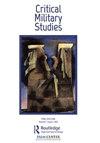关于边界和男子气概的话语变化如何导致逃避兵役的加剧
Q1 Arts and Humanities
引用次数: 0
摘要
这项研究通过观察人们对边境和男子气概的态度变化,探讨了“逃避兵役”的大规模加剧。基于2011年进行的采访和对2011年至2019年塞浦路斯兵役和“逃避兵役”的报纸报道的内容分析,本研究表明,在边界和男子气概话语不断变化的背景下,逃避兵役可能会加剧。特别是,内部边界的开放,向欧洲联盟扩大边界,以及冲突的中心点从内陆边界转移到海洋边界,是塞浦路斯导致逃避兵役的三个边界变化。此外,新兴的“欧洲-塞浦路斯”霸权男子气概与军方保持着薄弱的关系。本文通过对塞浦路斯的案例研究,说明关注边界安全观念的变化和重新配置的霸权男子气概将有助于揭示公共安全模式,并为逃避兵役提供启示。冲突后塞浦路斯的研究结果可以帮助理解西方和冲突后社会的逃避兵役行为。本文章由计算机程序翻译,如有差异,请以英文原文为准。
How changing discourses on borders and masculinity leads to the intensification of draft evasion
This study explores the vast intensification of ‘draft-dodging’ by looking at changes in attitudes towards the border and masculinity. Based on interviews conducted in 2011 and content analysis of newspaper coverage of military service and ‘draft-dodging’ in Cyprus between 2011 and 2019, this study shows that draft-dodging can intensify in the context of changing discourses on borders and masculinity. In particular, the opening of internal borders, the enlargement of borders to the European Union, and the shifting of the locus point of the conflict from inland to the maritime boundaries are the three border changes in Cyprus that contributed to draft evasion. Moreover, the emerging ‘Euro-Cypriot’ hegemonic masculinity maintains a weak relationship with the military. Through the case study of Cyprus, this article illustrates that paying attention to changing notions of border-related security and the reconfigured hegemonic masculinity will shed light on the model of public security and offer implications for draft evasion. The findings from post-conflict Cyprus can help understand draft evasion in Western and post-conflict societies.
求助全文
通过发布文献求助,成功后即可免费获取论文全文。
去求助
来源期刊

Critical Military Studies
Arts and Humanities-History
CiteScore
1.90
自引率
0.00%
发文量
20
期刊介绍:
Critical Military Studies provides a rigorous, innovative platform for interdisciplinary debate on the operation of military power. It encourages the interrogation and destabilization of often taken-for-granted categories related to the military, militarism and militarization. It especially welcomes original thinking on contradictions and tensions central to the ways in which military institutions and military power work, how such tensions are reproduced within different societies and geopolitical arenas, and within and beyond academic discourse. Contributions on experiences of militarization among groups and individuals, and in hitherto underexplored, perhaps even seemingly ‘non-military’ settings are also encouraged. All submitted manuscripts are subject to initial appraisal by the Editor, and, if found suitable for further consideration, to double-blind peer review by independent, anonymous expert referees. The Journal also includes a non-peer reviewed section, Encounters, showcasing multidisciplinary forms of critique such as film and photography, and engaging with policy debates and activism.
 求助内容:
求助内容: 应助结果提醒方式:
应助结果提醒方式:


